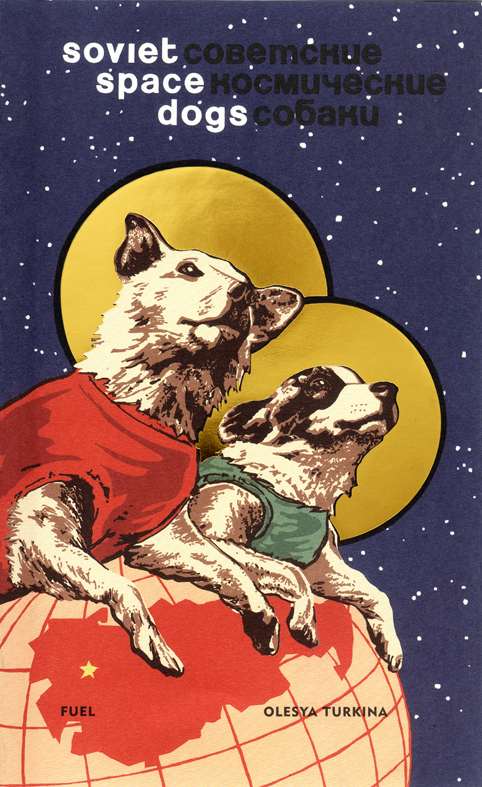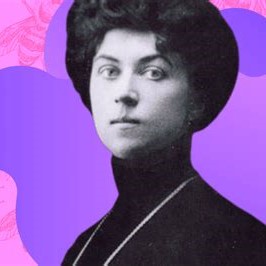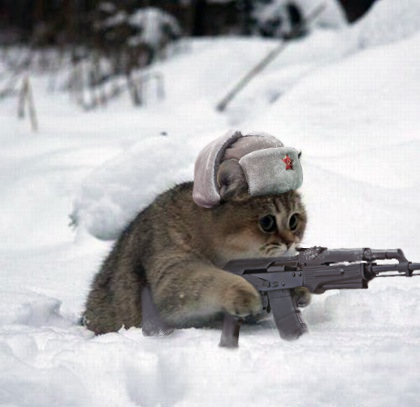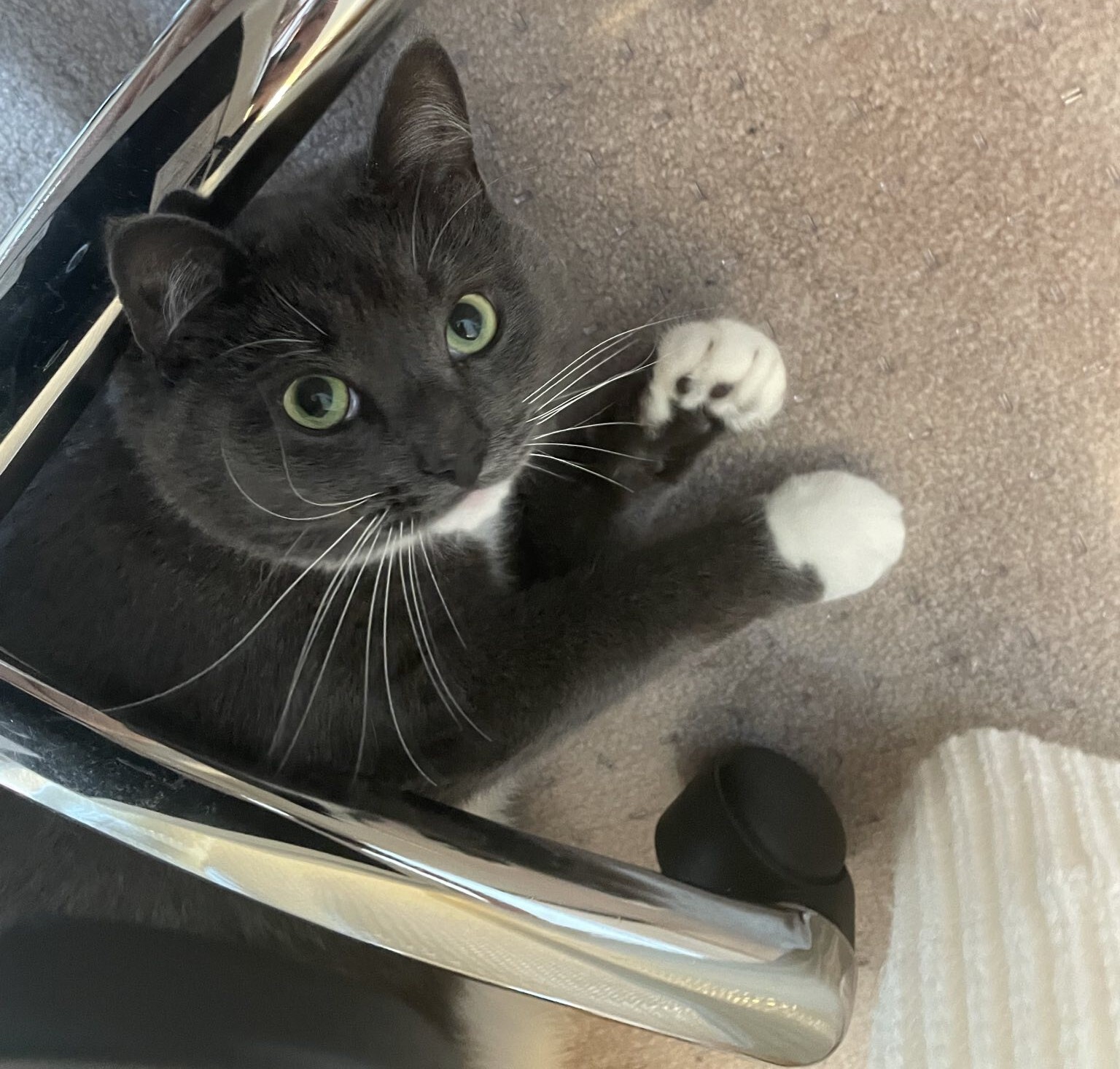Usually I only write about my Political Science class on here as my History courses so far don’t talk about “relevant” issues, if they do I (try to) reliably bring it up. What different for this week is that my history class is going to spend time talking about the holodomor. For a quick refresher, this history class is about Genocides, so that gives you an idea of how this whole thing will be talked about.
For this week we have to read Kiernan’s Blood and Soil chapter 13, Douglas Irvin-Erickson’s “Raphael Lemmon, Genocide, Colonialism, Famine, and Ukraine,” and Mike Davis’ Late Victorian Holocausts: El Niño Famine and the Making of the Third World. I have no idea if that last one is about the holodomor but it is being covered this week. I will also have to watch accounts from these two websites:
Today was the first class and we didn’t talk about the holodomor but went over a very bastardized history of the Soviet Union. He starts the class by saying he is introducing the Soviet Union and their multitudes of war crimes, some of which might be considered genocide. So we begin the week with Nazi Germany’s “totalitarian” neighbour (yes, he really said that). He briefly goes over the Bolshevik revolution and this concept called “war communism,” he does not talk about the Tsars at all. Lenin institutes a new economic policy, my professor calls it a “recognition of reality,” this went on from 1921-1928 and were, in his opinion, the best years. Lenin dies in 1924 and there is a power struggle that Stalin eventually wins. He then goes on to say that Stalin doesn’t believe in anything except what directly supports him, so he bounced back between factions depending on who supported him. Some girl then asks about Trotsky’s assassination for some reason, her exact question was when he was killed. After finding out the date, which someone had to look up, he decides to say, while he’s not a Trotskyist, he believes that Trotsky was an alternative route that wouldn’t have been as bad as Stalin.
Then we talked about the 5 year plan. According to this lecture the 5 year plan was supposed to transform the Soviet Union into full communism. It would remove the peasantry from their farms to turn said farms into collective ones, which would theoretically increase agricultural output, but that output would not actually happen, chaos would ensue and the famine would become a reality. the 5 year plan would liquidate, exterminate, those who resist it, AKA the Kulaks. The Kulaks are defined as land owning peasants who were the targets of violence due to their resistance. Throughout this lecture he and other students make parallels between the Soviets and the Nazis so prepare for that. If the Nazis targeted the Jews as scapegoats and the origins of suffering, then the Soviets did the same but with the Kulaks. He says Stalin’s Soviet Union generates mass violence and suffering like Nazi Germany, Mao’s China, and Polpot’s Cambodia. He then shows a slide with the apparent death toll, I would share the exact numbers but the slides aren’t yet available.
In 1937 there would be mass political purges due to Stalin’s paranoia. There was the Katyn massacre that killed around 22,000 politics military officers, intellectuals, and leaders. This is considered an elimination of a people’s identity. I guess the Soviets initially blamed the Nazis for the massacre but when the archives opened in the 90s it proved the Soviets committed it. With the famine the death toll was between 5 and 8 million, he also calls it “man made” so thats cool. At the end of this slide he states that there is a case to be made that these deaths were genocide. He also calls Stalin a mass murderer.
We learned in this class that genocide occurs during times of rapid change and societal upheaval, which is what the Soviet Union was going through beginning with the Bolshevik revolution. He said that the Soviets saw people as plants in a garden, some were to be cultivated while others were to be exterminated. He said the Bolshevik revolution happened in the wrong country as, according to Marx, it was supposed to happen in industrialized countries. Later he states the Soviets had an inferiority complex as they were constantly paranoid of enemy infiltrators because they considered Russia incredibly weak, he compares this with the Nazis and the Ottomans. The Nazis thought Jewish people controlled everything, that they were incredibly powerful, and the Soviets shared this attitude but with a social class rather than an ethnicity. Is he fucking for real?
Stalin portrayed Russia as a continuous victim throughout history, being conquered and losing to many different enemies. Everyone beat down on Russia because of her backwardness. The 5 year plan would try to achieve 50 years of progress that she missed out on. 1984 (because of course this cursed book was brought up) satirizes the Soviet slogan 2+2=5, which was a real slogan that was supposed to breed exceptionalism, the idea that “anything is possible.” This is a common sentiment in “totalitarian” regimes. He then makes fun of Stalin for trying to grow oranges in Siberia, because apparently Stalin thought genetic engineering was “capitalist” and that the Soviet science of gene cooperation would yield results better. Stalin had lemon trees in his yard that his servants would bring into a secret greenhouse during the winter. This is implying that Stalin was an idiot. Cool. A student brings up how Stalin once bragged about having tea time with Machiavelli (or someone), this was said to further dunk on him. A girl then asked about how “wasn’t there an incident where Soviet scientists accidentally released a bunch of anthrax?”, my professor couldn’t answer this but he did say it wouldn’t surprise him. The agriculture yields in the Soviet Union were very bad due to Soviet bunk science. According to Stalin, suffering was okay, because the ends justified the means.
The Soviet Union is a peculiar case study as all of the ones we want over so far have a nostalgia for the past, a cult of antiquity. But the Soviet Union was the exact opposite, it focused on an ideal future. A girl then says that left wing genocides are the opposite of what we know (what we learned in class) as with the Nazis, they wanted to revert back to the ideal German past, progress was bad. With the Soviets and left wingers in general the past is seen as bad while the future is good. The idea of the “good old days” does not apply to this case. My professor then brought up the family structure: Nazis idealized the nuclear family while the Soviets sought to break up the individual family unit because it was a bourgeoisie concept. This, of course, misses all of the analysis of the idea of family but okay, let’s just say the Soviets broke families up. Stalin also wanted to destroy peasant culture/communes, he did not want that life to be admired. He brings up an NKVD guy being killed (exterminated) as an example of the revolution eating its own people, which the Soviet Union did I guess. The Nazis had one target (Jewish people, and while they did have many victims they focused on one group), the Soviets, however, had many targets. A girl, who is actually from Ukraine, said that it was like the “freedom from religion” thing in France but in this case it was “freedom from culture.” The Soviets (mainly intellectuals) looked down on the peasantry and they themselves had very little support from the countryside. The 5 year plan was a war on the countryside, to steal agriculture to build cities. The ideal Soviet man was a factory worker, not a farmer. The Soviets had a cult of modernity rather than a cult of antiquity.
Next we moved on to “imperial expansion.” The Soviet Union is considered an empire but i did not have colonies to exploit like western nations. He brings up a Stalin quote about how the West exploited the people of their colonies to industrialize themselves, he asked if that was true. I nodded my head explicitly but everyone seemed hesitant to agree with big bad Stalin. Even my professor awkwardly conceded that Stalin was kind of right about that. Instead of doing imperialism outwards the Soviet Union turned its imperialism inward, it exploited its own people, the peasants would be subjugated by the proletariat. My professor said that Stalin did not see the peasants as people. There was settler colonialism in the far east, the Indigenous nomads of that end were forced to settle in the region and people who were purged were forcefully deported to Siberia.
Racism was complicated in the USSR. It initially cultivated ethnic and cultural difference, supporting the regional languages and cultures while they could live relatively autonomously. Social class differences were placed above ethnicity. This all changed coming up to WWII when xenophobia and Russia chauvinism reared its ugly head. This was the last two minutes of class, he briefly brought up the tartars in Crimea but not much was said except purges.
Next class we will dive into the holodomor, which he says some historians argue that it was a purposeful targeting of Ukrainians.
the 5 year plan was supposed to transform the Soviet Union into full communism
damn i almost choked on my drink here
this is such a bad faith analysis of the soviet union i almost cant believe it. i wonder if they do this to every western country as well hmmm.
As you can tell from this lecture, it’s less about being accurate with deep analysis and more so about clowning on Stalin and the Soviets, Russian Soviets to be more specific. It was hard to get through without rolling my eyes, I had to physically turn my head away so no one (professor mainly) would see my expressions.
you are stronger than i am because i would either break or just leave
I did briefly contemplate just walking out but I sit in the front and in the end just didn’t bother. I also really don’t want my professor asking questions lol
This was me whenever they would make fun of and shit on Stalin:
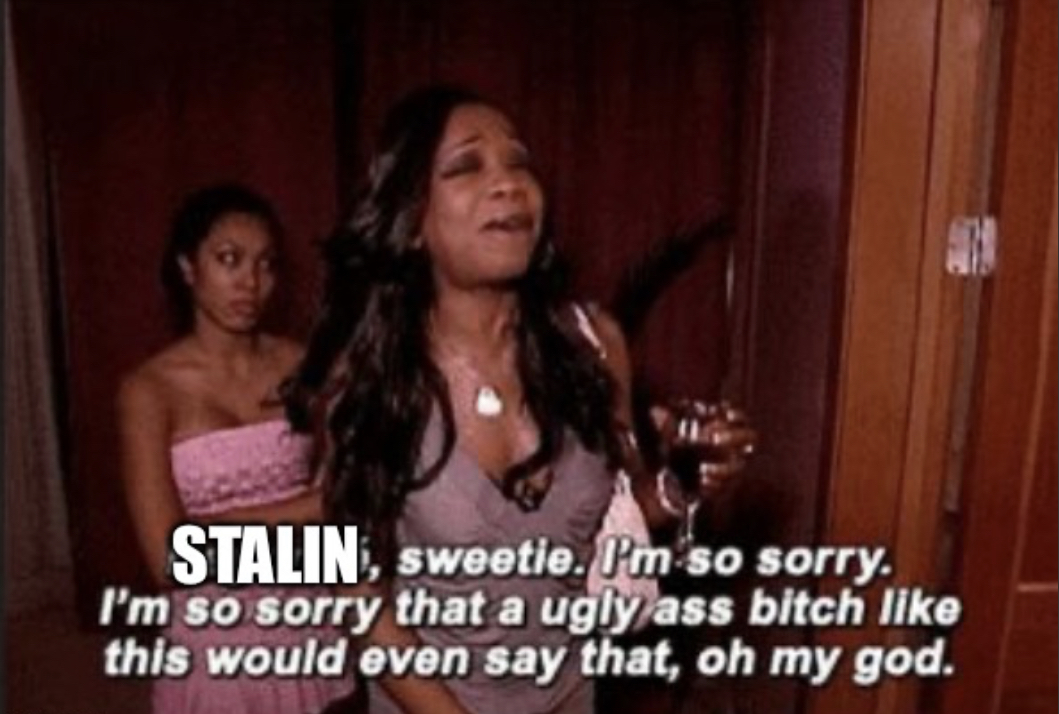
Summary: anticommunist trying to do the double genocide theory. Aka equivalence between Nazis and soviets, aka genocide denial with extra steps.
I don’t even know if he is truly aware of what he’s doing, I don’t even think the school is either, to be honest. They’re teaching genocide denial. If they are aware of this then they clearly do not give a shit, those OUN posters proved that to me before this.
After the west dismantled the USSR all the propaganda they spread got legitimized as “history”. Now that there’s no one to speak on its behalf, there’s no one to question the narratives that surround it. As long as it’s anticommunist you can say just about anything and people will believe you. You can even be a historian teaching about genocide while doing genocide denial.
You’d think after the archives were opened the truth would be set free but i guess not. This is one of the reasons I want to be a Marxist professor, so I can teach the real and truthful history but I have no idea what awaits me down that path of life. Sometimes I ask myself if this professor should even be teaching this class as he has said himself that he is an expert on British history. When he speaks in Ukraine and Russia I have to roll my eyes because he clearly doesn’t know what he’s talking about and he knows this, he even said he doesn’t know much about that region and when i showed him the OUN flag posters he was confused. Looking at his publications he’s written about camps/mass confinement with a focus on the British empire, but it looks like he’s written articles (including opinion pieces) about China’s Uyghurs (yes, he believes its a genocide because of course he does). We won’t be talking about the Uyghur situation as. Subject in class but it is an optional reading assigned for the end of the semester. I wonder if he’s even aware that he’s doing genocide denial by teaching about the holodomor in this way. I don’t think I’m in a position to even bring it up to him as a question.
LMAO so why’s he the one who’s teaching the class anyway? Having (ostensibly) studied genocides, you’d think he’d be wise to how they’re reported and how they actually happen.
Do you think he’s privy to some academic insider knowledge or do you think he just regurgitates headlines like the rest of us? If it’s the latter, then you shouldn’t worry about qualifications for becoming a professor.
He honestly doesn’t seem privy as whatever he says (and my political science professor too, to be honest) just repeats what I’ve seen/heard on typical news headlines. If he does have insider academic knowledge then he’s not really showing it. They don’t go nearly as deep as I would have thought. It is disappointing, but like you said, maybe it’ll be easier to become a professor than I initially thought. I hate being such a dick about my professors, because they do have good qualities (they’re nice to me), but COME ON.
Sometimes it seems that profs prepare for lectures outside their discipline by skim reading one or two textbooks and filling in the blanks with general knowledge.
I had one prof who literally read the textbook to us. In the most dull, monotone way possible. With a prosody that suggested he didn’t know the content. No additions, no embellishments. And the lecture wasn’t long enough for him to finish the chapter, so he would finish it in the next lecture. Needless to say, idk if he finished it because I didn’t go back to that one. Best thing was – it was his bloody textbook! You’d have thought he would know the content well enough to ad lib some of it even if he used the book for structure, etc, but no.
Most academics are known to not know anything outside their expertise. They brag about it ffs. Or they did to me, when I was an undergrad. It’s not always their fault, I suppose. The academy is structured to discourage curiosity. Especially curiosity about political economy and historical context. They can’t have profs reading, after all, because that way undoubtedly lies Marxism.
If he uses Applebaum as a source on how the Holodomor was a targeted action against Ukrainians just pull up the Tauger essay which debunks Applebaum by using her own sources. Tauger primarily does this in large part by simply taking into context the whole paragraph of a given source, rather than just one sentence.
If he brings her up in class I’ll bring it to office hours, do you know the name of the essay? I want to make sure I’m getting the right one.
This is the one I had in mind, I’m sure his other pieces are fine as well.
I just find the method of this to be so hilarious. Debunk some anti-communist “historian” just by quoting the book and reading the cited sources for just a few sentences longer.
https://historynewsnetwork.org/article/review-of-anne-applebaums-red-famine-stalins-war-o
As a fun sidenote, Anne Applebaum is the wife of Polish politican Radek Sikorski of “thanking the US for blowing up Nordstream" fame. https://tass.com/world/1514367 She’s also a member of the NED and CFR, to give some idea of her excellent credentials as an imperial stooge.
Perfect, thank you so much! Applebaum seems like a nightmare of a person. I had no idea her husband was that guy, the more you know I guess.
I know that you couldn’t see or hear it, but throughout your account I was repeatedly groaning and holding my temple with an impatient look in my face. Not because of anything that you said, but because his ‘analysis’ of the 1932–3 famine—and the Soviet Union in general, really—is classic antisocialist brainrot.
The Soviets had a good reason to be worried because anticommunists jointly invaded and sanctioned the RSFSR almost as soon as it existed, whereas they gave Fascist Italy and the Third Reich plenty of time to grow. Winston Churchill also claimed that he wanted to ‘strangle communism in its cradle’ or something to that effect; the threat from the capitalists was in no way imaginary, not within the USSR and not without.
The British Empire alone should prove that the capitalists were both amazingly powerful and wanted to control the world. Soviet anticapitalism was as irrational as Fascist antisemitism? Please… that is a preposterous claim to make and expecting you to take it seriously is an insult to your intelligence.
We can argue that the way that the Soviets dealt with the petite‐bourgeoisie could have been handled better, but equating the Soviets’ class warfare with the Shoah is simply unnecessary. The Shoah was a way to preserve capitalism, not reduce it.
Nazis […] wanted to revert back to the ideal German past, progress was bad.
I mean… this is mostly true, but it is also somewhat misleading considering how much the Fascists valued innovations in military technology. ETA: Actually, this isn’t ‘mostly true’. It’s just an oversimplification.
I kind of nodded to that last point that you quote when I read it but after your criticism I see that it’s problematic in another way, too. Nazis (I’d say liberals do this, too) might idolise antiquity but it’s part of a process of trying to shape a new nation. (Notwithstanding the new vision is incomprehensible because what happens when the state succeeds in killing all the ‘enemies’ and all the problems of capitalism continue?) If anything, it may be more that pretty much everyone agrees that the present is bad (except neoliberals, apparently).
You raised a good point. ‘Progress’ is a pretty broad term; I initially judged the conclusion as ‘mostly true’ anyway because I assumed that the student had freedoms for the oppressed in mind. I thought that she couldn’t have meant the term literally because then that would have been obviously false: nothing can be done without progress, so in that sense the Fascists clearly weren’t against progress, but that could be said for almost anybody.
The main problem is that it’s just a poor choice of words, really.
I hope you push back on all the incorrect things your teacher says. While your fellow students may not share your opinion (or care about the topic for that matter) I guarantee you they will find you arguing against the teacher much more interesting than the lesson itself and will side with you against the teacher if need be. Don’t be afraid to speak up!
I think you give my class mates too much credit. The ones that speak up the most seem to be on the same page as my professor, just dogging on Stalin (why do they hate his lemons?) and the soviets in general. I also have to be careful as there is a girl from Ukraine and I wouldn’t want to cause problems. Of course I wouldn’t be saying anything bad or personal but this is a very touchy subject and any sort of context or pushback could be seen as a bad thing and get me in trouble. My professor did say that he would speak up if I ever got dogpiled in class but that doesn’t really matter since nothing is stopping it from happening outside the class. I’m also just incredibly anxious with speaking so I don’t know if I’d do a good job. At best I can talk to him about it during office hours.
It’s hard and takes practice, but there’s a way of talking about touchy subjects that won’t alienate or upset people (so much – there’s always some risk).
It’s like a house of knowledge. Everyone has one. Some may be crumbling because they’re old or built on poor foundations, some will have towers and windows but no internal walls or plumbing or electricity, etc. None will be built perfectly, even your own. You can’t just move someone into a new house and you can’t demolish the one they’re in and rebuild it from scratch.
But you can move one brick at a time and move some furniture about. Eventually, you can find that you’ve renovated.
When it comes to most topics, the first task is to make people question what they think it’s true. Not too tell them they’re wrong but to get them to doubt what they know. This could be by showing that a claim is simply wrong (taking a brick out). Or by giving them an alternative truth (giving them a new brick). Sometimes you have to do both. Sometimes you have to do one today and the other in a week, month, or year.
The main point is that you don’t have to worry about correcting every one of everyone’s mistakes or misunderstandings. And certainly not all in one go. So if you want to broach e.g. Ukraine and you don’t want to alienate the Ukrainian student (understandable), have a think about what brick you want to take out or put in. In a way that won’t disturb to much of the rest of the house. I.e., and given the atmosphere of the class, you probably don’t want to go in hard with praise for the USSR or critical support for Russia.
But challenging the narrative that dismisses the sacrifice of the Ukrainians who fought the Nazis? You might get away with that. And most libs will be on board with the idea.
Two other points. 1. People tend to like the easy option. 2. People get defensive, especially when they feel that they’ve put in a lot of effort to learn something. So you can try ‘have you also considered/heard of’ or ‘i was reading xyz and they said’ rather than ‘you’re wrong’. If you trash too much of sometimes argument/worldview in one go, they just resist. One alternative thought at a time seems to go down okay. Tbh, I get the impression that you’re already good at this kind of thing.
This is a decent example, albeit ultimately anti-communist and anti-Russian: https://jewishcurrents.org/the-double-genocide-theory
You should bring this to the attention of the AUUC and The Canada Files if you can find a way to not doxx yourself comrade.
I wouldn’t know the first step in doing this, to be honest. I’ve never contacted anyone about this sort of stuff so, I considered giving the photos I took of the OUN posters displayed at my school to some sort of “press” but because I had already showed and asked my professors about it I thought it’d be a bad idea. What would they even do with this sort of information? Is it really worth it?
It’s possible if the slides were made available, you could pass those along anonymously. Obviously if you feel you’ll be doxxing yourself, don’t do it though.
I think I’m understanding what you’re saying, but I’m still a little confused as to why I should do it. Like, do I just email anonymously about my class and show the information? Would they even want to have this? I guess I never really saw this as anything more than class buffoonery. I kind of worry that I would be bothering the people at The Canada Files and the AUUC with something I initially saw as inconsequential… I hope I’m making sense here.
The problem you might face now is that you’ve spoken about the content and shared images here. If you now share this info with an org and they publish something or start a campaign, your lg account is already attached to the story. If anyone sees that story and posts it to the fediverse, it may be easy to make a connection between your lg account and your irl location/institution. So you risk doxing yourself if you take things further in this instance.
Edit: not to mention that you’re profs will connect the dots if they’re featured in the news after your questions in office hours.
It why I didn’t go to any presses about the library display, because I really screwed up on that one going o my professors first thinking they’d even care. That’s my bad and I wont be making the same mistake again. And of course you’re 100% correct about this story being linked to my lemmygrad (both the display story and just the general class material). I’ve shown my ass to much at school this semester that I have to lie low again, though if something crazy happens I’ll just let the Canada Files know instead of going to my professors (or even writing here about it just in case). I do hate having to be so secretive but I know why it has to be done. Posting on here has made me realize just how naive I am lol
Couldn’t ye make like a throwaway google account?
Worst comes to worst, they ignore you. I’d say that based on the reporting of the canada files, this would be of interest to them. Again, it’s up to you but I think exposing that this anticommunist propaganda is being allowed to flourish is worth bringing some attention to outside of here.
This kind of propaganda is everywhere. I can’t see how anyone would be surprised that it’s going on or allowed to flourish. That’s not to say that Marxists should ignore anticomunism. I just think we should be careful about encouraging isolated, individual actions that could put people at risk for limited or no benefit.
Fair enough, I just figured that since this is a professor at a university it may be worthwhile. At the end of the day, I won’t hold it against interstellar doggo if they choose not to contact anyone.

